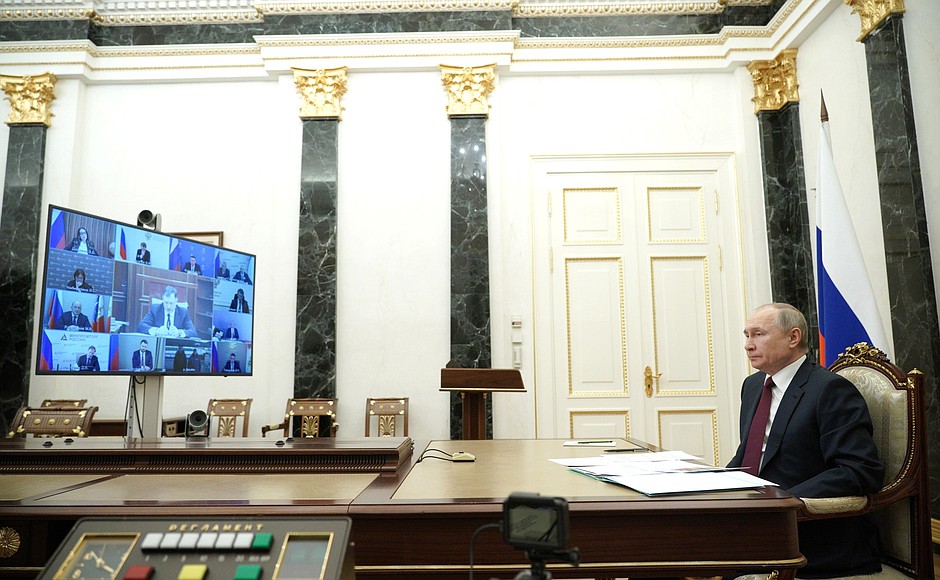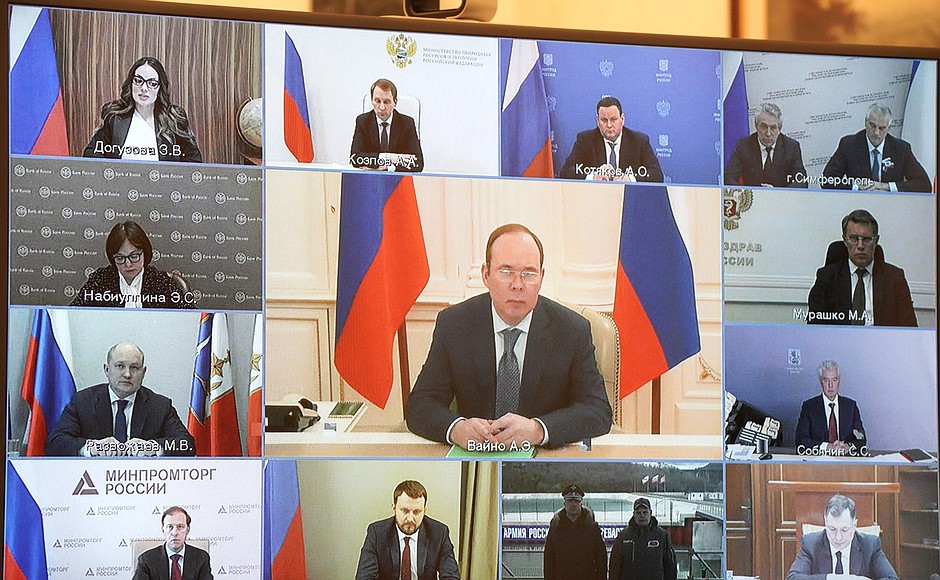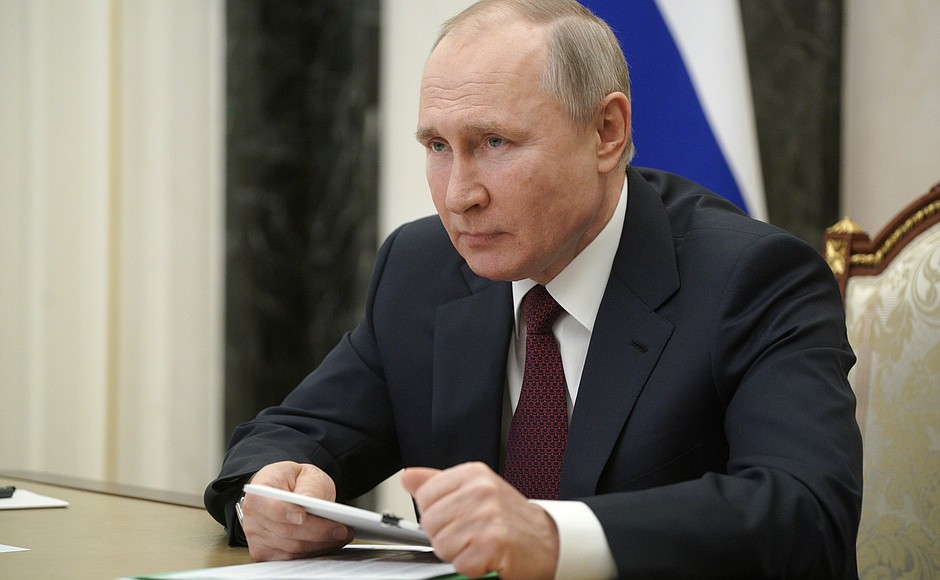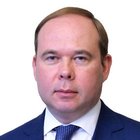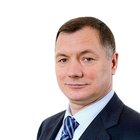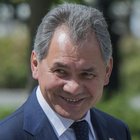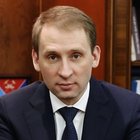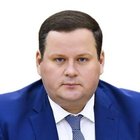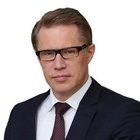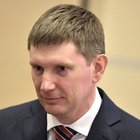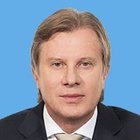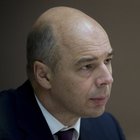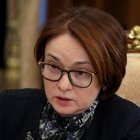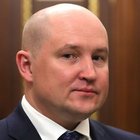The meeting was attended by Chief of Staff of the Presidential Executive Office Anton Vaino, Deputy Prime Minister Marat Khusnullin, Presidential Aide Maxim Oreshkin, Defence Minister Sergei Shoigu, Minister of Natural Resources and Environment Alexander Kozlov, Minister of Labour and Social Protection Anton Kotyakov, Minister of Industry and Trade Denis Manturov, Minister of Health Mikhail Murashko, Minister of Agriculture Dmitry Patrushev, Minister of Economic Development Maxim Reshetnikov, Minister of Transport Vitaly Savelyev, Minister of Finance Anton Siluanov, Minster of Constriction, Housing and Utilities Irek Faizullin, Central Bank Governor Elvira Nabiullina, Head of the Republic of Crimea Sergei Aksenov, Governor of the City of Sevastopol Mikhail Razvozhayev, Moscow Mayor Sergei Sobyanin, Head of the Federal Agency for Tourism Zarina Doguzova, Head of the Federal Anti-Monopoly Service Maxim Shaskolsky, Deputy Defence Minister Timur Ivanov and RosGeo Director-General Sergei Gorkov.
* * *
President of Russia Vladimir Putin: Good afternoon, colleagues.
Today is a special, remarkable, and festive day.
But now I suggest we focus on the work issues and problems that require a solution. We will discuss further steps to ensure the social and economic development of Crimea and Sevastopol, and will talk in detail about the issues that you need to deal with.
You know, I have just met with members of the public in Crimea and Sevastopol. There is no doubt that our task is to listen and respond to the citizens’ requests and initiatives at all times. We must do it all across Russia, in each republic, region, city and village. This fully applies to the Crimean Peninsula, a region of strategic importance.
Providing support to Sevastopol and Crimea residents is our top priority. This attention to the region by the Federation also requires efficient, high quality work by all agencies, regional and municipal authorities.
I want to emphasise that we have been doing and will do everything we can to ensure the stability and security of Crimea, as well as the comprehensive development of transport, energy and all other infrastructure. We will support industrial and agrarian enterprises, small and medium-sized businesses, tourism, and create conditions for new investments.
Based on all this, the quality of life of our citizens should improve at an advanced rate, so that they have every opportunity to receive a good and relevant education, contemporary and high-tech medical assistance, which we have already spoken about today, as well as decently paid jobs, so they can plan their future for years ahead, build families and bring up children.
From the beginning, we understood that due to the problems accumulated over decades, it was impossible to do everything at once. This required systematic and painstaking work. And in fact, this is how we proceed, we move towards the set goals gradually, step by step.
In the first stage, we began with the implementation of large, let us put it another way, support projects with high social and economic significance without which it was difficult to imagine a normal life.
These included the expansive and unique Crimean Bridge with its motorway and rail sections, the Tavrida Motorway, and the newest Simferopol air terminal. This list will definitely be updated.
We managed to remove the threat of energy shortages due to the expedited launch of generating capacity, the construction of an energy bridge and modernisation of the local grid equipment. We broke through the energy and transport blockade. I am confident we will resolve the other problems, including water. At this point, this is the most acute, priority issue for all Crimea and Sevastopol residents.
As you know, I instructed the Government to develop and begin implementing a Comprehensive Plan to ensure reliable water supply to the Republic of Crimea and the city of Sevastopol. This is estimated to run until 2024. And given that the problem is urgent, we agreed to act as quickly as possible and in several areas at once. This includes the development of underground water reserves, the construction of various hydraulic units and treatment systems, as well as the elimination of losses in water supply networks and the desalination of sea water.
Today I would like you to report on how this comprehensive project is progressing, what has already been done for the summer peak season, how Crimea and Sevastopol residents and tourists will be provided with water. Also, our colleagues at the water supply facility in Sevastopol will contact us via videoconference. And we will listen to a report on the progress of the construction of the facility in the Republic of Crimea.
Colleagues,
As I have already said, the successful completion of major basic projects creates favourable conditions for the launch of the next, second, stage of restoring and developing the economy of the Crimean Peninsula.
In effect, this stage implies that the infrastructure, created by the state, should provide opportunities for implementing many more investment projects in all sectors, from industry to the service sector. Above all, we are talking about business initiatives.
Consequently, one of the issues on our current agenda concerns private investment incentives, measures to improve the business climate and to make financial services more affordable.
All of us know the causes of the difficulties and the largely artificial barriers. I would like to note that it will be possible to speak of the success of our actions only if we manage to ensure a substantial and drastic increase in private investment. Their volume in Crimea and Sevastopol should exceed one trillion rubles in the next four years, that is, in 2022–2025.
This is certainly an ambitious task. I repeat, it will require concerted action on the part of federal, regional and municipal authorities, and it is necessary to conduct work while maintaining dialogue and close contact with the business community. It is necessary to study all the proposals from entrepreneurs in the most attentive manner and to ensure they are promptly assessed.
Of course, issues of Crimea’s long-term development are also linked with the prospects of the tourist industry. In 2020, despite all pandemic-related difficulties, 6.9 million people vacationed in Crimea. Of course, this figure is less impressive than in 2019 when eight million people visited the region, but it is still quite impressive.
We should start receiving ten million tourists annually by 2025. At the same time, every person and every guest arriving in Crimea and Sevastopol has a right to expect decent service standards, not inferior to foreign alternatives, as well as a wide range of affordable and high-quality services as regards living conditions, public catering, guided tours, cultural programmes, clean and well-equipped beaches, and public spaces.
Our tourism industry in Crimea with its unique natural, cultural and health-improvement potential simply has to meet top global standards.
Let us start discussing all the issues on the agenda.
<…>
Vladimir Putin: Our development programme for Crimea and Sevastopol has been extended until 2025, as it has already been mentioned here. We will continue to improve and build new roads, including the project Mr Khusnullin has mentioned just now: three exits from the Taurida motorway towards the Black Sea coast bypassing Simferopol. We must complete the last section of the motorway with a comfortable entry into Sevastopol. The project is proceeding according to plan.
We will also continue building social facilities – schools, kindergartens, healthcare and cultural establishments.
Of course, attention must also be given, as it has been pointed out today, to water supply, disposal and sewage systems, which are extremely important for resorts and unique places such as Crimea and Sevastopol. Overall, plans provide for building 1,000 facilities, 400 of which have already been completed.
<…>
